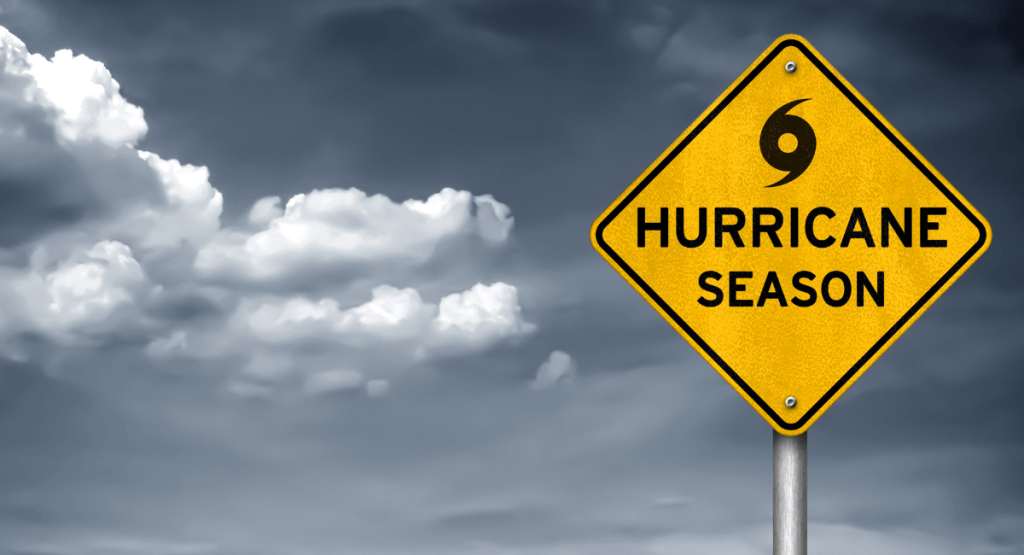
As a Florida native, I’ve ridden through many a hurricane in my lifetime, and everything comes with it. I went from being scared as a kid, living it up during hurricane parties in my 20s, and as an adult, being annoyed with the inconvenience of it all. (Yes, that is how many Floridians see hurricanes: as annoying inconveniences.) We all think we’re immune to being scared over hurricanes because they happen so often, and as long as it’s a Category 3 or less, we all think it’s no big deal. But then, you grow up, you have kids, and it’s suddenly a whole new ball game: do I need to evacuate now even though it’s only a Cat 3? If we stay, are we putting our kids at risk? But if we leave, how much money and time will we potentially be wasting, not to mention the stress of packing our kids up to go live in a hotel for a few days?
Ugh. I do not miss hurricanes at all, and it was a huge part of why Pennsylvania was so appealing: no more hurricanes! (Or alligators, spiders, scorpions, scorching high temps and insane amounts of humidity… but that’s another post for another day.) I was so excited to live somewhere without extreme weather. But then I found out that, hey, guess what? Hurricanes hit Pennsylvania, too. Yippee!
READ: South Central PA Summer Bucket List: 50+ Things to Do!
Hurricane season starts on June 1st every year, and runs through the end of November, and while Pennsylvania — not being a coastal state — obviously does not get any direct hits, hurricanes can still affect us here in South Central PA.
Have no fear, though — you’ve got a bona fide expert (wink, wink) in riding out hurricanes here to guide you through! This post will walk you through what to expect, how to prepare, getting kids ready, and more.
What To Expect
During hurricane season, there are a few different storms you can expect: tropical depressions, tropical storms, and hurricanes. The difference between the three largely relies upon wind speed, with tropical depressions being the lowest and hurricanes the highest. And though Pennsylvania does not border the Atlantic Ocean, we can still be affected by hurricanes as they travel over land, or through indirect effects.
Indirect effects of storms are something we saw a lot living on the Florida coast; even though a hurricane may not hit your city dead on, the bands can still sweep over the region, bringing heavy rain, winds, flooding, and tornadoes.
So, what does that mean living in Pennsylvania? The first issue is, of course, rain; if a hurricane is nearby, that will bring heavy rain, and rain very easily means flooding. If you live near a lake, river, or creek, your property may especially be at risk. (You can see if your home is in a flood zone here.) A hurricane also means heavy wind, so there is the potential for damage to your home and property, especially if you have fencing and sheds. There’s a good chance of downed trees and power lines, and once the hurricane has moved over land, there is a good chance of tornadoes as well.
How To Prepare For a Hurricane
Now that hurricane season is upon us, it’s a good idea to be prepared in advance. Get your important documents together, in a safe place, and have it be easily portable; we have a binder, for example. I would recommend keeping it in a waterproof, fireproof safe, but a binder means it’s easy to just grab and take with you if you do need to evacuate.
We like to have a hurricane kit ready for our family. It’s a good idea to know now what your community’s emergency plans are, what the evacuation routes are, where emergency shelters are located, and so on; all of that info will be printed out and placed in our emergency planning kit. Familiarize yourself with all the ins and outs of your home, such as how to shut off electrical power, gas, and water to your home, and prepare ahead of time for where you’ll stock any potential hazards.
What are hazards? Well, anything you have outside that can be lifted up by the wind — lawn furniture, grills, outdoor decor, bird feeders, and so on — are dangerous in the event of a storm. It helps to know ahead of time where you will put all of those things in advance, so in the couple of days before a hurricane, you’re not scrambling to figure that out while also worrying about where you’re evacuating to and where to put Fluffy.
Yes, Fluffy. What will you do with your pets? That’s another thing to plan for. If a hurricane comes, what will you do? There are options to safely board them, if that’s what you want, or you can take them with you if you evacuate, but you’ll have to plan either way. If you want to board your pets, you’ll need to find a facility that can handle a storm. If you take them with you, you’ll need to know what your options are for pet-friendly hotels or AirBnBs. And not to keep beating a dead horse, but knowing this ahead of time will make your life so much easier in the event that you do have to evacuate!
What Supplies To Get
Not sure what you’ll need if you’re riding out a hurricane? Have no fear; we’ve got you covered. First things first: a generator. This isn’t in everyone’s budget, and we’ve certainly been through a few hurricanes without them. But if you can manage to get one, it will make your life a lot easier.
Whether or not you have a generator, it’s a good idea to have a supply of gasoline ready, and I would recommend getting it now instead of waiting until there’s a storm warning. The gas stations will be crowded, and in some circumstances, can easily run out. You’ll get a lot of stress out of the way by having gas ready now, so if you have to evacuate, you don’t have to worry about stopping to fuel up.
Water is another big one; you’ll need at least one gallon of water per person, per day, so stock up ahead of time. Filling up your bathtub with water is also super helpful, because you can use that for things like the toilet or cleaning, and save your bottled water for drinking. Other supplies:
- Canned and non-perishable food to last at least three days, if not longer
- A manual can opener
- Candles
- Matches or lighters
- Batteries
- Flashlights
- Battery-operated radio
- First-aid kit
- Medications
- Sleeping bags
- Extra clothing
- Blankets
- Board games, books, and cards
One thing you should not do? Tape up your windows. This is a myth, and a dangerous one, because it not only doesn’t work, but it can make the glass shards larger if they’re broken, making them more dangerous to anyone in the area.
How To Prepare Kids
The idea of a hurricane can be scary, so talk to your kids about hurricane season now. If we actually do see any hurricanes hit South Central PA this year, it will be a lot easier for them to grasp if they already know about it, and they’re less likely to be scared.
One thing I loved doing as a kid was tracking hurricanes each year. You can print out a hurricane tracker, or just use a map showing the Atlantic Ocean and East Coast of the United States, and then together as a family, map out the hurricanes throughout the season. I liked using a different color marker for each storm, but you do whatever works for you!
It can also help to practice an evacuation drill a few times with them, so they know what to expect. Let them be involved in all the preparations, because again — they’ll know what to expect. A lot of the fear for kids is that they don’t know what’s happening or what will happen, so demystifying the process will go a long way. And make sure to have their favorite things with them if you do decide to evacuate, such as any beloved stuffed animals or toys.
Above all, stay calm. Reassure your children that everything is OK, that they’re allowed to be scared, but that everyone will be fine. Kids will follow your example, so if you’re calm, they’re more likely to be calm.
Are you prepared for hurricane season?




